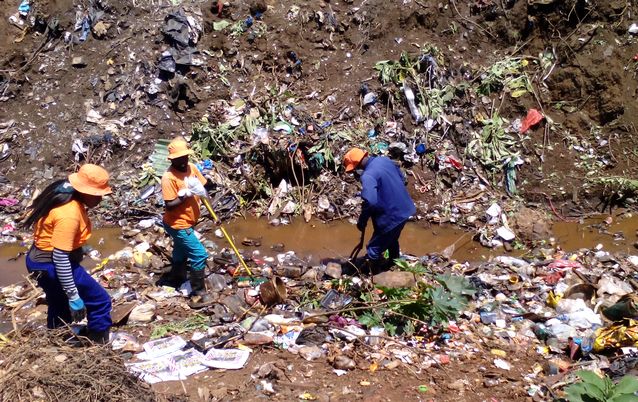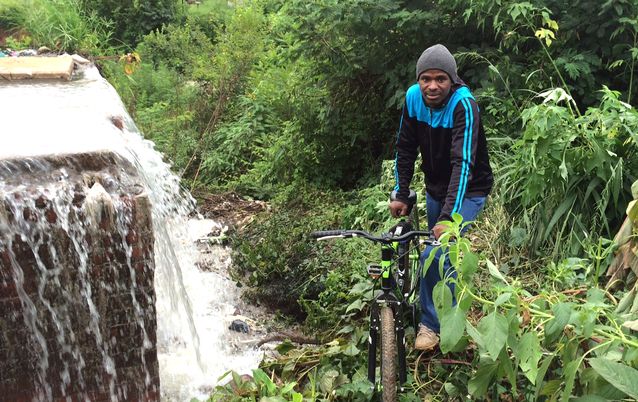A YOUNG man on a mountain bike is cycling along the sewer line near Ashdown township on a tributary of the Msunduzi or Duzi River in KwaZulu-Natal. Alien invasive bush along the line has been cleared to open access.
He stops at a point where sewerage is pouring into the tributary from a leak in the pipe, takes out his cellphone, logs a GPS reading, photographs the leakage, and sends the information to the Msunduzi Municipality.
He is one of a team of nine pollution monitors and 27 sewer-access clearers who have been employed by the Msunduzi Sewer Project from the nearby Edendale township. It is a formal partnership between the Duzi-Umngeni Conservation Trust and the municipality.
Funded by the World Wide Fund for Nature Nedbank Green Trust, the Msunduzi Green Corridor is managed by the trust’s Richard Clacey, an economic development and environmental specialist who focuses on the links between the health of the Msunduzi River and development issues in Edendale.
Now in its second year, the three-year pilot project is promoting partnerships between communities and the public and private sector to arrest and reverse the rapid decline of the Duzi River and its tributaries. It is tackling the severe sewerage contamination and solid waste problem.
"We have a long-term vision of establishing a green corridor along a 60km stretch of the Duzi — from its source through the Edendale Valley to Camps Drift (the start of the Duzi Canoe Marathon) linked by ‘green hubs’," Clacey explains. "These are areas with integrated river health activities, including conservation agriculture, river-side parks and trails linked to sport and recreation, in addition to river-health monitoring and riparian restoration."
Valued at R50m, the annual Duzi Canoe Marathon contributes significant finance, employment, and development canoeing initiatives to communities in the uMngeni Valley, which the Duzi River feeds.
SA hopes to host the 2017 Canoe Marathon World Championships on the Duzi.
Anything more than an E.coli or sewerage contamination count of 1,000 is a health risk for direct contact and the Duzi rivers are frequently registering counts of more than 10,000 year round, sometimes registering above the 100,000s. Communities living alongside the river and its tributaries use the water for drinking, agriculture and industry.
"High faecal content in the river system poses a major health risk, which can result in severe illness such as diarrhoea, kidney failure, abdominal cramping and even death," Clacey says. "A Water Research Commission report that undertook detailed water sampling in the lower reaches of the Umngeni River identified the presence of cholera, shigella, salmonella, and other harmful viruses."
The declining state of the Duzi River system poses a risk to the sustainability of water supply to the eThekwini municipality, with significant economic and social consequences for Durban’s 3.5-million residents. The pollution in the Duzi River is contributing to a phosphate build-up in Inanda Dam, which in turn results in the intermittent blooming of toxic green-blue algae that threatens the quality of Durban’s water supply.
"The Msunduzi Municipality has acknowledged that the number of sewerage pipe bursts into the Duzi has gone from 1,471 in 2006-07 to the current 4,380 as a result of main-line blockages in the sewerage lines," Clacey says. "The sewerage pipe infrastructure in the Duzi is not being sufficiently monitored and maintained, and is becoming increasingly dilapidated.
"The manholes are often used as dumping sites because of waste-management service delivery failure, and sewerage pumps out of the manholes and into the river. As many as 12 manholes a day are pumping sewerage directly into the Duzi and its tributaries.
"On top of this, there are truckloads of solid waste being offloaded into the river daily; and the problem is getting worse."
In 2006, Clacey started working as a volunteer in a river clean-up project on a stretch of the Dorpspruit tributary of the Duzi, close to Pietermaritzburg.
"During this time, I came into contact with the work of the Duzi Umngeni Conservation Trust, which is dedicated to improving the health and wellbeing of the river and the communities who live along the Duzi and Umngeni Rivers," he says.
The trust is tackling sewer pollution, industrial pollution, solid waste, illegal sand mining, and alien-weed invasion. Established in 2005, it was initially driven by Duzi Marathon canoeists, but it has since grown into a programme that includes 16 river-care teams.
It has established eco clubs at 40 schools along the Duzi; an enviro-champs programme in Mphophomeni township adjoining the Midmar Dam and developed the Msunduzi Green Corridor project.
The corridor pilot project is focusing on two problem hotspots – Pietermaritzburg’s townships of Ashdown on the Duzi; and Imbali and Slangspruit on two major tributaries of the Duzi.
"We need to expand the meaning of environment to all communities and as part of our approach to achieve this, we cleared a running and cycling trail in the natural environment around Ashdown," Clacey says.
In June last year, the project hosted the Msunduzi Green Corridor Trail Run, and for the first time, many members of the surrounding community visited their green area. A recycling and international river clean-up day was hosted in September.
"It is about people making the river their own, and about understanding their individual and collective responsibility to champion clean water, to report sewage leakages, to stop dumping refuse in the river and to discourage others from doing so."
The project also monitors how long it takes the municipality to fix identified problems. It is working on expanding urban agricultural projects as a source of livelihood.
"It is a slow process, but we are confident by the end of this pilot, we will be able to start expanding the green hubs," Clacey says.
-

Sewer-access clearers clearing solid waste that blocks the storm water drains along the Duzi River. Picture: SUPPLIED
-

DUCT: Sewer monitor and community youth leader, Nathi Kubheka, stands his bicycle next to a leaking sewer manhole in Ashdown, concealed under thick bush, alongside the Ashdown tributary that flows into the Msunduzi River. Picture: SUPPLIED
A YOUNG man on a mountain bike is cycling along the sewer line near Ashdown township on a tributary of the Msunduzi or Duzi River in KwaZulu-Natal. Alien invasive bush along the line has been cleared to open access.
He stops at a point where sewerage is pouring into the tributary from a leak in the pipe, takes out his cellphone, logs a GPS reading, photographs the leakage, and sends the information to the Msunduzi Municipality.
He is one of a team of nine pollution monitors and 27 sewer-access clearers who have been employed by the Msunduzi Sewer Project from the nearby Edendale township. It is a formal partnership between the Duzi-Umngeni Conservation Trust and the municipality.
Funded by the World Wide Fund for Nature Nedbank Green Trust, the Msunduzi Green Corridor is managed by the trust’s Richard Clacey, an economic development and environmental specialist who focuses on the links between the health of the Msunduzi River and development issues in Edendale.
Now in its second year, the three-year pilot project is promoting partnerships between communities and the public and private sector to arrest and reverse the rapid decline of the Duzi River and its tributaries. It is tackling the severe sewerage contamination and solid waste problem.
"We have a long-term vision of establishing a green corridor along a 60km stretch of the Duzi — from its source through the Edendale Valley to Camps Drift (the start of the Duzi Canoe Marathon) linked by ‘green hubs’," Clacey explains. "These are areas with integrated river health activities, including conservation agriculture, river-side parks and trails linked to sport and recreation, in addition to river-health monitoring and riparian restoration."
Valued at R50m, the annual Duzi Canoe Marathon contributes significant finance, employment, and development canoeing initiatives to communities in the uMngeni Valley, which the Duzi River feeds.
SA hopes to host the 2017 Canoe Marathon World Championships on the Duzi.
Anything more than an E.coli or sewerage contamination count of 1,000 is a health risk for direct contact and the Duzi rivers are frequently registering counts of more than 10,000 year round, sometimes registering above the 100,000s. Communities living alongside the river and its tributaries use the water for drinking, agriculture and industry.
"High faecal content in the river system poses a major health risk, which can result in severe illness such as diarrhoea, kidney failure, abdominal cramping and even death," Clacey says. "A Water Research Commission report that undertook detailed water sampling in the lower reaches of the Umngeni River identified the presence of cholera, shigella, salmonella, and other harmful viruses."
The declining state of the Duzi River system poses a risk to the sustainability of water supply to the eThekwini municipality, with significant economic and social consequences for Durban’s 3.5-million residents. The pollution in the Duzi River is contributing to a phosphate build-up in Inanda Dam, which in turn results in the intermittent blooming of toxic green-blue algae that threatens the quality of Durban’s water supply.
"The Msunduzi Municipality has acknowledged that the number of sewerage pipe bursts into the Duzi has gone from 1,471 in 2006-07 to the current 4,380 as a result of main-line blockages in the sewerage lines," Clacey says. "The sewerage pipe infrastructure in the Duzi is not being sufficiently monitored and maintained, and is becoming increasingly dilapidated.
"The manholes are often used as dumping sites because of waste-management service delivery failure, and sewerage pumps out of the manholes and into the river. As many as 12 manholes a day are pumping sewerage directly into the Duzi and its tributaries.
"On top of this, there are truckloads of solid waste being offloaded into the river daily; and the problem is getting worse."
In 2006, Clacey started working as a volunteer in a river clean-up project on a stretch of the Dorpspruit tributary of the Duzi, close to Pietermaritzburg.
"During this time, I came into contact with the work of the Duzi Umngeni Conservation Trust, which is dedicated to improving the health and wellbeing of the river and the communities who live along the Duzi and Umngeni Rivers," he says.
The trust is tackling sewer pollution, industrial pollution, solid waste, illegal sand mining, and alien-weed invasion. Established in 2005, it was initially driven by Duzi Marathon canoeists, but it has since grown into a programme that includes 16 river-care teams.
It has established eco clubs at 40 schools along the Duzi; an enviro-champs programme in Mphophomeni township adjoining the Midmar Dam and developed the Msunduzi Green Corridor project.
The corridor pilot project is focusing on two problem hotspots – Pietermaritzburg’s townships of Ashdown on the Duzi; and Imbali and Slangspruit on two major tributaries of the Duzi.
"We need to expand the meaning of environment to all communities and as part of our approach to achieve this, we cleared a running and cycling trail in the natural environment around Ashdown," Clacey says.
In June last year, the project hosted the Msunduzi Green Corridor Trail Run, and for the first time, many members of the surrounding community visited their green area. A recycling and international river clean-up day was hosted in September.
"It is about people making the river their own, and about understanding their individual and collective responsibility to champion clean water, to report sewage leakages, to stop dumping refuse in the river and to discourage others from doing so."
The project also monitors how long it takes the municipality to fix identified problems. It is working on expanding urban agricultural projects as a source of livelihood.
"It is a slow process, but we are confident by the end of this pilot, we will be able to start expanding the green hubs," Clacey says.






















Change: -0.47%
Change: -0.57%
Change: -1.76%
Change: -0.34%
Change: 0.02%
Data supplied by Profile Data
Change: -1.49%
Change: 0.24%
Change: -0.47%
Change: 0.00%
Change: 0.06%
Data supplied by Profile Data
Change: -0.15%
Change: 1.44%
Change: 1.03%
Change: 0.51%
Change: 1.53%
Data supplied by Profile Data
Change: 0.25%
Change: -0.42%
Change: 0.07%
Change: -1.05%
Change: -0.37%
Data supplied by Profile Data